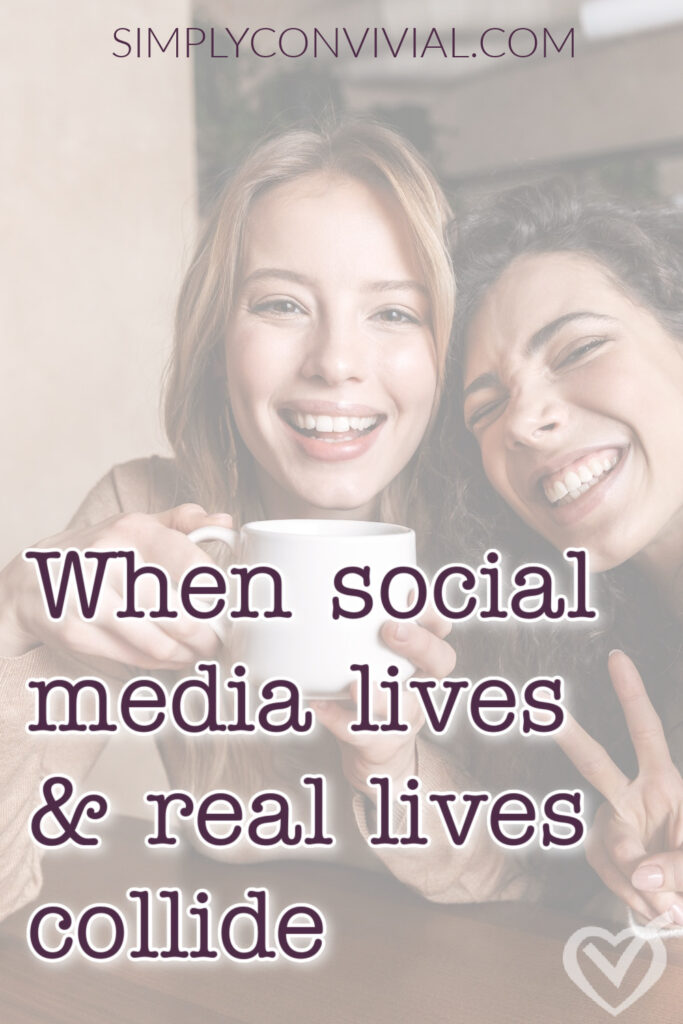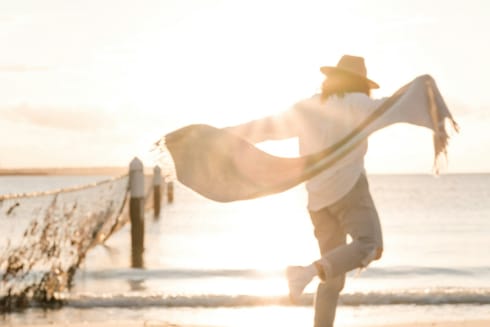
When social media lives & real lives collide: the new landscape of manners
Explore the evolving norms of online-to-offline friendships, fostering authentic connections, and navigating social conventions in the digital age. Moms, let's make manners.
I have many good and even close friends I first met on the internet. Back in the day when being online was weird, I had a blog. I also read blogs.
I remember the day where Brandy Vencel, whose blog I read and with whom I’d had countless conversations in comment threads, sent me a personal email. Oh! Now we’re really having conversation.
Many years after that, we met in person at a Charlotte Mason retreat in Seattle. I wouldn’t have gone myself, but there were 5-6 ladies there – Brandy included – who I knew from online and was excited to be able to hang out with in person.
I don’t remember when many of us adopted the Voxer app, but with it I had actual voice conversations with my many online friends as well as in-town and far-flung real-life friends.
Scholé Sisters has hosted 7 retreats, each time traveling to a different location and doing an in-person meetup. It turns out, I even have friends on the internet I don’t know at all. But when we get together around a table, we’re on the same wavelength and have a great time.
I have friends I first “met” on Instagram. I have online friends I made before Instagram – or even Google – existed. It used to be weird, but now everyone understands.

We need new manners for new social settings
However, even though most of us have people we like online – perhaps with whom we’ve had conversations even – social conventions and norms have not caught up to the new landscape.
It might be socially normalized to have friends online you’ve never met in person, but there are no social conventions governing how you behave when you do, in fact, meet in real life.
Added to the complicated mix of social expectations is the fact that many times we silently follow people. We listen to someone’s podcast, follow her on Instagram, like things she posts on Facebook. We get emails from her. But she doesn’t know our name.
What happens when we encounter one another in real life? I have a connection, but she doesn’t know it? How do we handle this?
There are some loose protocols for meeting celebrities, perhaps. You walk up to someone after a conference or a concert, stand in line to say “hi” and “thank you.” You begin by introducing yourself, but everyone knows the person who was just on stage doesn’t need to partake in introductions.
If that famous person were ordering a coffee or walking down the street, people might turn and look, but only the boldest would walk up and introduce herself – and many might assume there are other motivations in play. Even in this scenario, the celebrity does not return the favor of the introduction, but is the one who decides if this encounter will be acknowledged or ignored.
Yet now we have a different scene. The mom I follow on Instagram is no celebrity, no matter how many followers she has. She’s living her real life, sharing bits and pieces here and there. I relate to what she shares. I know that if we lived in the same town, we’d be friends. We all know what this feels like on the follower end. If you’re posting anything online, you probably also have silent followers, pretend friends, and don’t know it.
Local introductions – no need be awkward
So, imagine one or both of us moves. Now, suddenly, we are in the same small town. Maybe we wind up at the same church or the same homeschool coop.
How do we handle introductions? Do we say, “Oh! I follow you on Instagram!” Isn’t that weird?
It’s certainly not a social scenario our mothers encountered. It’s not one we’ve been prepared for by convention.
It’s time to think about and create the convention, because it doesn’t have to be weird or awkward. We should not allow our typical online behavior to inhibit and freeze our in-person social interactions. If anything, it should go the other way.
We should think about our online social behavior more like in-person social behavior. Do we act stalkers online? No wonder we feel weird when we come face-to-face with our “prey.” Were we embarrassed and reluctant to leave a comment online? No wonder we’re embarrassed and reluctant to offer our hand and hello locally.
Yet this goes the other way, as well. What we share online, we share with the world, not the void. If a stranger you’re just meeting in person for the first time knows things about you that make you uncomfortable – remember, you’re the one who shared those things. Whatever we share online counts as public knowledge, even if our social media accounts are private.
Social media changes not only our online interactions. It changes our personal interactions as well, and we’d do well to consider how it does so and change intentionally.
Most of the awkwardness, I believe, stems from two sources.
When there are no social norms
First, we just don’t know what “manners” actually looks like in the situation. There are no rules, norms, or conventions, so we’re at a loss. We don’t know how to bridge the gap of “meeting” someone with whom we’ve shared many details of life with – and yet all the sharing has been one-sided.
I don’t think the solution is to pretend the scenario is novel. The solution needs to be acknowledging the new social playing field and behaving as kind, charitable Christian women on both ends of the exchange.
When we’re out of practice
Second, we might get so comfortable with less-personal online interactions that we are no longer comfortable with face-to-face social settings. We probably all experienced this to some degree or other after 2020. Through lack of use, our in-person social muscles atrophied. Some are still perhaps needing more recovery work even now.
The solution isn’t to abandon online social media. The solution is to prioritize face-to-face community and let the real-world inform the virtual rather than the other way around.
Our online social personas need to be regulated by our real personas in three ways in particular.
The problem with face filters
First, although we can use them occasionally for humorous effect, adding filters to our faces is falsifying our interactions. It can be fun to act like a different person online, to live out a different persona and have people respond differently to you online than they do in real life. Filters provide an easy-button for added glory and added barriers at the same time. It can function the same as a mask, worn to hide true identity, worn so that in a real-world line up, you wouldn’t be recognized.
Proper online behavior should mean that what we say and who we are online should match and be recognizable when those online friends become local friends. That will happen. Don’t pretend to be anonymous online. You’re not.
The problem with public places
The second way our real personas should be informing our online behavior is that we shouldn’t share things online we wouldn’t share in mixed company at a party. Often online we act like we’re having a back-corner conversation with our closest friends, when we’re really speaking into a microphone on a stage. Sure, most people aren’t paying attention, but what we’re saying is not small or private. Pretending it is or wanting it to be doesn’t make it so.
What we publish online is pushed out there into the wide world, into mixed company, publicly accessible for anyone who cares to find it. Even if your account is private, don’t publish as if you’re having a private conversation.
The internet is not private. The internet is a public place. It’s a big party, and anyone might be wondering into your little conversational huddle.
The problem with living a double life
Third, count on your online life and local life merging. When I was in high school and college, having conversations with strangers on the internet, it felt totally anonymous. No one knew I was just a kid. We all used “handles” and not our real names. I related to the You’ve Got Mail line, “Goodnight, dear void…”
Things have changed, our identities are wrapped up in our online interactions and although sometimes we pay lip-service to privacy, no one actually cares because we just want instant, easy service and are willing to pay with the currency that seems so ethereal to us but is pure gold to marketers and governments: all our tracked devices.
Instead of going conspiratorial here, I actually want to point out the social good in the merging of online and real life friendships. As many, many families rearrange themselves all across America, more of those online conversations are becoming face-to-face.
New communities are forming, and people learn about them online, then actually move to join them. The connection is a blessing, and we shouldn’t be embarrassed or ashamed or awkward as we introduce ourselves to someone new and realize we have seen one another online. It’s cool. Acknowledge it and have fun with it.
Online friends can be real friends
C.S. Lewis said, “Friendship is born at that moment when one person says to another, ‘What! You too? I thought I was the only one.'” That’s how we find one another online. I do believe – and have experienced – that such friendships formed online are just as valuable and valid as local friendships. However, the test of the validity of those friendships is whether or not they stand the test of face-to-face friendship.
Online friends are not the ones bringing you meals when you have a new baby. They aren’t the ones seeing your kids misbehaving and calling you out on it – because they only see what you show them. Online, we necessarily do not have the full picture that we do in face-to-face friendships. So local friendships should still carry more weight with us, and receive more attention. Local friendships take more effort and time than online friendships.
But we should not fear one kind of friendship becoming another. We need to get over awkwardness over liking someone online and then meeting her face-to-face. Just be upfront. Hey, I’ve seen your Instagram – I like it! That’s a complement, not weird, not stalker-like. This is the new world we live in. “Hey, I’ve seen your name in the Sistership community!” It’s ok if she didn’t notice you or if you don’t post and only follow. This is the world we live in. Acknowledge it. Anyone who is posting ought to be comfortable having those posts acknowledged. It’s ok. It’s not awkward.
Be always hospitable
Once, over a dozen years ago, a homeschool mom from Texas reached out to me via email. She followed Brandy Vencel and so had come across some of my stuff and had seen that I lived in the town where her husband had just taken a job. She’d been researching churches, but emailed for local info. They were coming out to scout the area in a few weeks.
I showed the email to my husband, and we invited them over for dinner while they were in the area. They didn’t end up at our church, but we did end up in her nature study group, we had dinner together several times over the next ten years, and I went to her book clubs.
This is Christian community in action and should be totally normal for us. It’s not weird that she read my blog and reached out to me and I had no reciprocal knowledge of her. It didn’t mean that I was on some different plain. She found me online because we were likeminded. Because we were likeminded, we were friends.
Having moved to a new town two years ago now, I am so grateful for the couple ladies who were already local here, who saw in my emails or on my blog that we were moving, and invited our family over for dinner.
I’ve gone out to coffee with ladies many times over the last two years and had families over for dinner, and there’s no tinge of weird celebrity-ism. It’s not “fan-girling” to say, “Oh, I listen to your podcast” or “Hey, I read your book!”
Posting online doesn’t make anyone a celebrity
Following someone online doesn’t have to put the conversation on that old-school celebrity plain. This world of self-publishing, micro-niche podcasting, social media posting means that acknowledging that you resonate with what someone has put out there is the equivalent of saying, “What! You too? I thought I was the only one.”
We actually now have an immediate connection because we’ve both identified that we have a common interest and likeminded perspective.
So, when you’re online, be who you are, in public.
When you meet someone who you’ve seen online, there’s no need to be embarrassed or awkward. You’re simply acknowledging a common interest.
Moms, we are the makers of manners
At the end of Shakespeare’s Henry V, Henry tells Katherine, “We are the makers of manners.”
We have no king here in America. We pretty much have no manners here in America. Moms, we are the makers of manners.
Let’s talk about online and offline manners and conventions with our friends – online and offline. Let’s be intentional. Let’s think it through. Let’s not just let default awkwardness rob us of camaraderie in our Savior and our work. Make light of it. Have fun with it. The social scenes are shifting and we have to adapt. Adapt intentionally, because no one’s defaults are properly calibrated.
Let’s hash it out and be intentional
Our daughters are coming of age in a new social world. We’re the pioneers and can help set the stage for them rather than leave them to the wolves. And with that wildly mixed metaphor, I turn the conversation over to you. Continue it in your family and in your real-life circles.
Want to take further action?
Register for my on-demand Stop the Scroll Masterclass. Take 1 week to incrementally makeover your phone usage without guilt or overwhelm.




